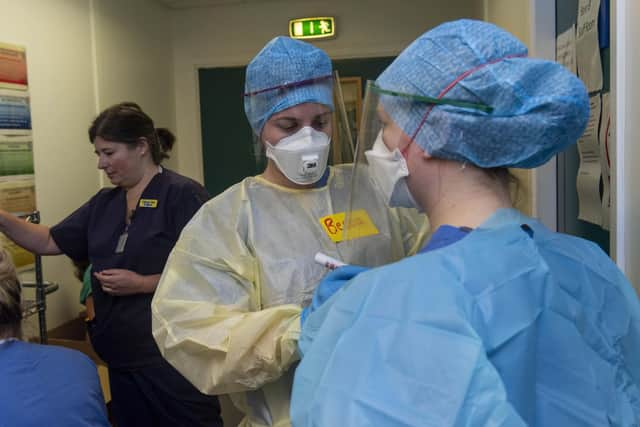NHS in Scotland is enduring ‘perpetual winter’ amid crisis ‘many years in the making’ – BMA
Lewis Morrison, chair of the BMA in Scotland, issued the warning after it emerged earlier this week that three hospitals under the NHS Lanarkshire board had run out of space.
It came as figures showed Covid-19 infections dropping in Scotland for the first time in two months, amid hope that the UK is over the latest peak.
Advertisement
Hide AdAdvertisement
Hide AdNHS Lanarkshire said on Wednesday it was “beyond critical occupancy levels across its three acute hospitals” – University hospitals Hairmyres, Monklands and Wishaw – because of “relentless pressures, bed shortages and staff shortages due to annual leave, sickness absence and self-isolation”.


Mr Morrison said he has “never known a prolonged period of pressure like this at any point in my career”, and said while last winter was considered to be the most challenging faced by the NHS, this year may be worse.
He said: “The news this week that NHS Lanarkshire is back at its highest state of alert and its hospitals are basically at or beyond capacity is just another indication of the perpetual winter that Scotland’s NHS is enduring.
“I’ve said before that I have never known a prolonged period of pressure like this at any point in my career. High alert warnings like this used to be reserved for the most difficult points in winter months, when we were in the midst of flu season – but now they are year-round events.”
Mr Morrison warned the pressures are not confined to NHS Lanarkshire or to hospitals, but are present across Scotland with impacts on GP surgeries and community care.
He said there is “no simple answer” as to how the situation has arisen, but there is “no doubt this has been many years in the making”.
He added: “The truth is that years of underinvestment and failure to properly plan for the staff we need, or value the staff we have, are absolutely coming home to roost.
“The result is a system that just doesn’t work properly any more – staffed by people on their knees and genuinely at the brink of what they can cope with.
Advertisement
Hide AdAdvertisement
Hide Ad“Last winter was supposed to be the most challenging our NHS has ever faced – yet we already fear that this winter may be worse.”
Mr Morrison said there are no “quick fixes”, but NHS staff must be focused on and given support.
A failure to do so could result in the loss of many staff “who simply can’t take the daily punishment of doing the job anymore”.
He added: “Some honesty from our politicians on the scale of the challenge will help with this – and then finally we may start to address the need to make sure our NHS is sustainable for the future, with the well-supported and planned staffing cohort it so clearly needs to meet demand.”
The latest Covid statistics are the biggest sign so far that the current wave may have peaked, and comes as the number of hospital patients with coronavirus is also starting to drop.
Infections are not on a clear downwards trend in all parts of the country, however.
Some 3.2 million people in private households in the UK are estimated to have had Covid-19 in the week to July 20, down 16 per cent from 3.8 million in the previous week, according to the Office for National Statistics (ONS). It is the first time total infections have fallen since the week ending May 28.
The current wave has been driven by the BA.5 Omicron subvariant, which is now the dominant form of Covid-19 in the country.
Advertisement
Hide AdAdvertisement
Hide AdIn Scotland, 272,000 people were estimated to have had the virus in the most recent week, or around one in 19. This is down from 340,900, or one in 15.
An estimated 2.6 million people in England were likely to have had coronavirus in the week to July 20, the equivalent of around one in 20, the ONS said. This is down from 3.1 million, or one in 17, a week earlier.
Wales has seen infections fall to 156,200, or one in 19 people, down from 183,200, or one in 17.
Northern Ireland is only UK nation to have seen a week-on-week rise in prevalence, though the ONS describes the trend as “uncertain”.
Professor James Naismith, from the University of Oxford, said it is “encouraging” to see the current wave “falling backwards”, and that prevalence of the virus “will have fallen further” since the ONS estimates were compiled.
A Scottish Government spokesperson said: “The NHS remains under pressure and is still facing its most difficult challenge ever in its 74-year history. We know that the pandemic is not over and that COVID-19 and other pressures will continue to impact the NHS for some time.
“We recognise the significant additional pressure staff are facing both within NHS Lanarkshire, and indeed across our health and care services, at this time. We will continue to do all we can to seek to alleviate those demand pressures and provide support for their wellbeing.
“Our NHS Recovery Plan is backed by more than £1 billion and we are committed to increasing the NHS workforce even further.”
Comments
Want to join the conversation? Please or to comment on this article.